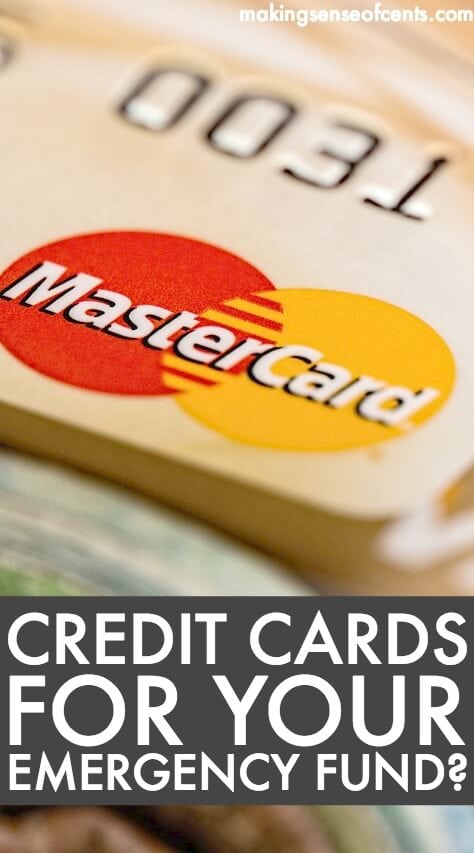 Lately, I’ve been hearing more and more about families relying on credit cards for their emergency savings fund.
Lately, I’ve been hearing more and more about families relying on credit cards for their emergency savings fund.
This is something that scares me as while credit cards may work for some, I believe that emergency savings funds are a better solution for the average person. Whatever emergency fund amount you decide on, it’s better than nothing in my mind.
As I stated in the article Everything You Need To Know About Emergency Funds, 26% of Americans have no emergency fund whatsoever.
Also, only 40% of families have enough in savings to cover three months of expenses, with an even lower percentage having the often recommended six months worth of savings.
There are many things you should think about when it comes to whether or not you should use a credit card as your emergency fund.
What’s your financial situation?
Different people need a different emergency fund amount.
Some of the things you will want to think about when determining your emergency fund amount is the stability of your job, your income when compared to your expenses, whether you own a house and/or car or not, your health, and more.
Basically, the “riskier” your situation, the larger the emergency fund you will most likely want. If your situation is quite risky, then using a credit card for your emergency fund may be a bad idea because there is a large chance you may rack up credit card debt that you are unable to pay off whenever an emergency arises.
How much risk are you willing to take on?
By relying entirely on credit cards, you are going to be taking on a lot of risk.
You never know if something may come up, how big the expense may be, and whether or not you will have enough credit to fund the expense.
Plus, the interest rate on your credit card may hover somewhere near 25%, which can make for an expensive bill if you are unable to pay your credit card bill before interest accrues.
When does using a credit card for your emergency fund amount make sense?
Now, I understand that different techniques work for different people. There are situations where using a credit card for your emergency savings fund may not be a completely bad idea. If you know that you can pay off a large expense within one month (such as if you have a large income but a low level of expenses), if you have a lot of credit card debt at high-interest rates that you are trying to pay off (your money may be put to better use by paying off your debt first), and so on.
However, the problem with this thinking is what happens if you lose your job? Many have emergency funds that exist so that they can support themselves if they were to lose their job. What would happen if you relied on credit cards but lost your main source of income?
It would lead to a lot of credit card debt. Unmanageable credit card debt…
Having a “real” emergency fund can be much more worthwhile.
There are many other reasons to have a fully-funded emergency fund:
- An emergency fund can help you if you lose your job. No matter how stable you think your job is, there is always a chance that something could happen where you may need money fast.
- An emergency fund is wise if you don’t have great health insurance. This is another reason why we have a well-funded emergency fund. We do not have the greatest health insurance, with our deductible being over $12,000 annually. Having an emergency fund can help protect us if something were to happen to either of us.
- An emergency fund is a good idea if you have a car. You just never know if it may need a repair.
- An emergency fund is a need if you own a home. One of the lucky things that homeowners often get to deal with is an unexpected home repair.
- An emergency fund can protect you in many other areas as well. This can include if you have a medical cost for your pet, if you have to take time off work for something, you need to go somewhere far to visit someone who is sick, and so on.
- An emergency fund is always good to have because it can give you peace of mind if anything costly were to happen in your life. Instead of building onto your stress because of whatever has happened, at least you know you can afford to pay your bills and worry about more important things.
As you can see, there are plenty of positives of having an emergency savings fund. However, I know that different things work for different people and that some prefer to use credit cards in the case of an emergency.
What do I think?
I think everyone should have some sort of emergency savings fund. Even if you can only manage $500 to $1,000 right now, that is better than nothing. $500 to $1,000 can still most likely help you by for at least a little bit. Plus, you can still put money towards high-interest rate debt after you build up your specific emergency fund amount.
My problem with using credit cards as your sole source for an emergency fund is that it may lead to more debt in some situations.
Do you rely on credit cards for your emergency savings fund? What do you think of relying on credit cards for your full emergency fund amount?

Leave a Reply